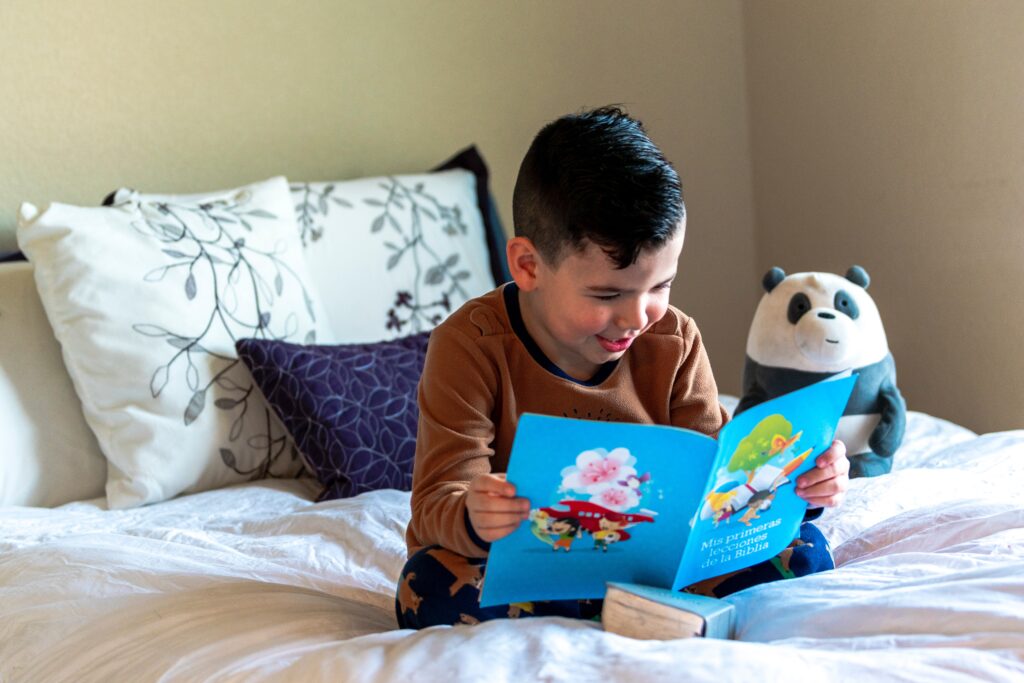Danielle Davy, one of our counsellors from AMH New Colin Counselling, has a great idea! This year Danielle will be buying a book for a friend and delivering it early on Christmas Eve. In return she will also receive a book to read that day.
Christmas Eve can be quite a stressful day for many – prepping the turkey, buying last minute presents, running around visiting relatives – but as we know this year will be different. Many of us will be having smaller gatherings, so with not as many spuds to peel and visting being limited, perhaps this is the year to have a calmer Christmas Eve, where you can relax by the fire, and read a book by the light of the Christmas Tree! Danielle will be hoping to surprise her friend this year with a book she has never read and is looking forward to seeing what she will be receiving! Let us know what books you will be gifting this year and which ones you are hoping will be in your stocking!!

Reading has been found to be hugely beneficial for our mental health.
Reading a book can be one of life’s biggest joys, and can also be a way of coping with the difficult times in life, like loneliness or bereavement or indeed life in lockdown.
According to research from Oxford University Press, reading “challenging language” sends “rocket boosters” to our brains, which in turn boosts our mental health. “Books can take you to a different place. They can relax you and calm you, and they can offer wisdom, or humour, or both.”

Sydney Timmins is a writer and founder of the Mental Health Book Club Podcast. Here are her top eight mental health benefits of reading:
1. Reading is pleasurable
When you start to read a really good book it is often hard to put it down, the story captivates you and time disappears as you become absorbed. When you reach the end, you feel sad because it is over, or you are so eager to get the next book in the series you are emailing the author daily! It is a magical feeling and choosing to read a book can provide a number of other benefits.
2. Reading can reduce stress
Losing yourself in a good book has been shown to reduce your levels of stress. Research by Dr David Lewis showed that reading as little as six minutes a day can reduce stress levels by 60% by reducing your heart rate, easing muscle tension and altering your state of mind. That same study showed that reading was better at reducing stress than music, drinking a cup of tea, going for a walk and playing video games.

3. Reading can provide an escape from the ‘real world’
Closely linked to reducing stress levels when you read is the ability to escape from the real world. I did this a lot as a child as a coping mechanism to dealing with the emotional hurt I experienced from my family. I often become immersed in that world and helped me to forget my worries.
4. Reading helps you develop empathy for others
People who read fiction have been shown to improve their level of empathy, the ability to understand someone else’s belief’s, feelings and thoughts.
5. Reading works your brain and prevents memory loss
Participating in cognitive activities, such as reading over your life time (both early and later in life) was shown to slow down memory loss when compared to those who didn’t participate in mentally stimulating activities. The same study also found that the rate of mental decline was reduced by 32% when people participated in reading, writing and other activities later on in life. While those with infrequent stimulating activity found that their decline was 48% faster than those with average activity.
6. Reading groups help to treat mental health issues
My default for when I’m feeling low is to read but there is actually scientific research that shows that reading and then talking about what you have read could be beneficial to mental health and well-being. There is something called bibliotherapy and it has a profound effect on people suffering with depression.
7. Reading helps teenagers develop insights into being an adult
Becoming an adult can be tricky – a lot of things change during this time and exploring self-identity is crucial. Research has shown that reading for pleasure in teenagers has three key benefits, reading was shown to enhance academic performance, social engagement and personal development. Fiction helped teens by providing significant insights into mature relationships, personal values and cultural identity all of which are important in the transition from being a child to becoming an adult.
8. Reading can make you smarter
I often feel smarter after reading books, I learn new things, experience different cultures, understand myself better and research has shown that reading does in fact make us smarter. Cognitive differences have been seen between those who read a lot and those who read a little. People who are exposed to more written information are associated with higher vocabulary, general knowledge, and verbal skills.
You can follow Sydney Timmins on Twitter, and listen to the Mental Health Book Club podcast on their website.